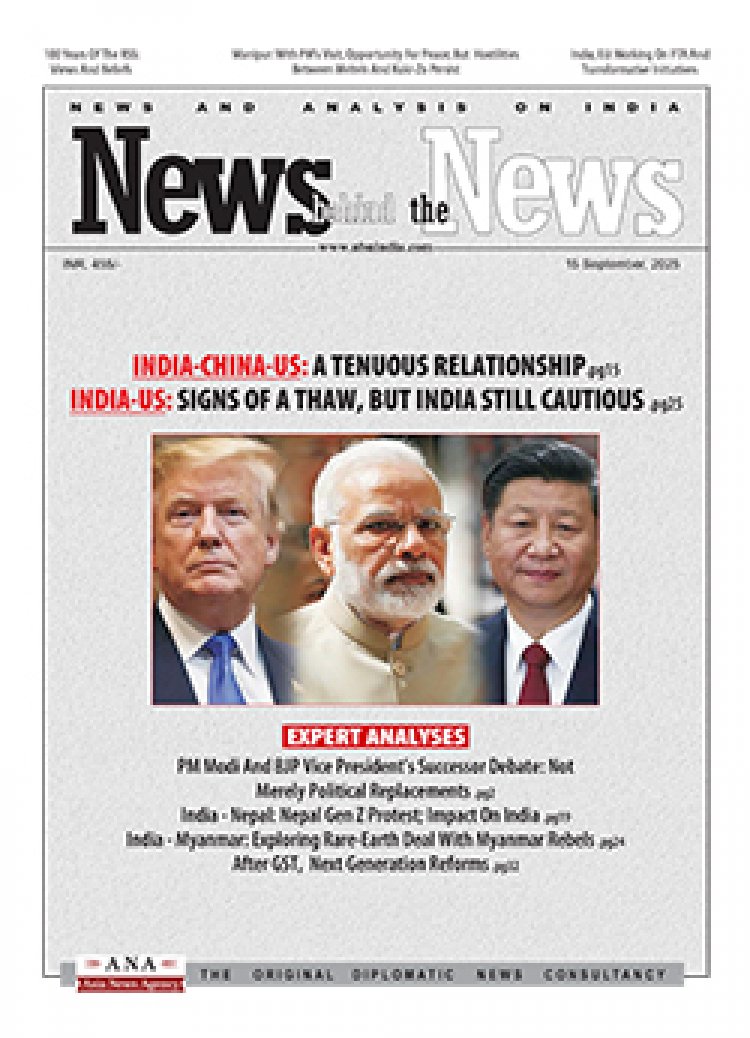‘Voice of Global South’ Silent on the Israel-Iran War
Asia News Agency

The government has declared that India has taken it as its responsibility to bring the ‘Voice of the Global South’ (VoGS) to the world stage. For some experts, it was time to make India’s presence felt ahead of G-7.
Incidentally, for the last three years, India has been hosting the Voice of the Global South Summit, which the government has shortened to VOGSS. The immediate provocation, writes Aakar Patel (chair of Amnesty International India) “for announcing our responsibility was linked to our arrival at the G-7, where India is not a member but designated, along with others like Mexico, Brazil, Comoros and the Cook Islands, as observers, meaning spectators. There is no real role…..”
India remains silent on G7 and SCO statements: The actual players in the Group of Seven — the United States, Britain, Canada, France, Germany, Italy and Japan — put out a statement affirming “that Israel has a right to defend itself. We reiterate our support for the security of Israel' and that ‘Iran is the principal source of regional instability and terror’.
VoGS had no opinion on this. It is time, says Patel “to make our presence felt elsewhere. The Shanghai Cooperation Organisation, where the VoGS is a member put out a statement in which they ‘strongly condemn the military strikes carried out by Israel’ and that ‘such aggressive actions against civilian targets, including energy and transport infrastructure, which have resulted in civilian casualties, are a gross violation of international law and the United Nations Charter’.
Although “all of this is unquestionably true,” India put out a counter-statement the same day distancing itself clarifying that 'India did not participate in the discussions on the above-mentioned SCO statement’.
Voice of the Global South also silent on Gaza: India also abstained from the UN resolution for Gaza ceasefire. The resolution condemned ‘the use of starvation and the denial of aid as tactics of war’ and demanded the lifting of the blockade by Israel. Patel notes “all South Asian nations voted for it except the Voice of the Global South.”
Incidentally, the unique initiative of the Voice of Global South ‘envisages bringing together countries of the Global South to share their perspectives and priorities on a common platform across a whole range of issues.’
On May 8, in a case relating to the living conditions and deportations of Rohingya refugees, the government told the Supreme Court that it neither recognises the UNHCR-issued refugee cards nor the Rohingyas as refugees since India is not a signatory to the 1951 UN Refugee Convention and therefore does not extend any refugee protections.
It need hardly be said that India’s non-ratification of the UN Refugee Convention cannot be an excuse to force people to conditions of danger, persecution and statelessness.
Patel suggests India should voice concerns of the Global South on shared humanity values.
India can mobilise the Global South over terror: a ‘T20: Twenty Against Terrorism’
Former foreign secretary, Nirupama Rao, presents a solution. In a recent article, she argued that the time has come to move beyond episodic outrage and towards building an enduring institutional architecture. She advocated a Global South-led initiative to combat terrorism not merely through punitive responses, but by integrating counter-terrorism into the development and justice frameworks of the emerging economies. Prime Minister Modi too raised this forcefully at the recent G-7 summit in Canada, sending a strong message to Pakistan.
We can go a step further, writes Pradeep S. Mehta (secretary-general of CUTS International, a 40-year-old leading global public policy research and advocacy group). “India, along with the African Union, can lead the formation of a G-20 task force on terror financing, with India simultaneously spearheading the launch of ‘T20: Twenty Against Terrorism’, a new multilateral platform shaped by those who endure terrorism, not just observe it…..
“India, as a democracy with deep counter- terrorism experience and development-first credentials, is uniquely placed to galvanise this movement.”
The underlying message of ‘Operation Sindoor' military strikes, is that “terrorism is no longer just a national issue. The networks that enable it, from hawala channels to crypto wallets, are global.”
There is therefore, according to Mehta “a case for the establishment of a permanent G-20 task force on terrorist financing…..Within the G-20 framework, we propose the creation of a ‘T20: Twenty Against Terrorism’ task force to unite the world’s most terror-affected regions: nations that are too often recipients of post-crisis aid, not partners in pre-emptive strategy.”
The T20, writes Mehta “will not replace the United Nations or the FATF, but complement them by bringing speed, field-based intelligence, and cultural context. The focus would be on: Local de-radicalisation models; Digital surveillance and capacity building; Community resilience; Financial tracking innovations; and real-time intelligence sharing.”
India has a “rising moral legitimacy as a voice of the Global South.”
















